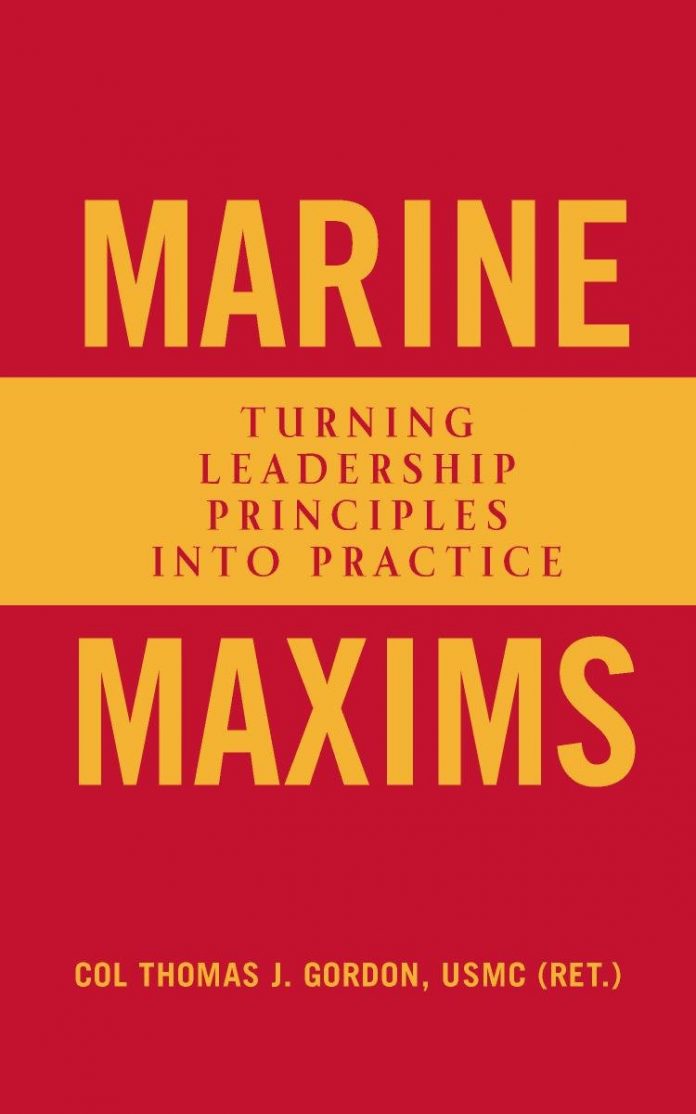
Marine Maxims: Turning leadership principles into practice. By Col. Thomas J. Gordon, USMC (Ret.). Naval Institute Press Annapolis, Maryland, 2021. ISBN 9781682476970 (hardcover)
Reviewed by LCDR Chris Wardle
Col. Thomas J. Gordon, USMC (Ret.), is a career Marine with thirty-years of leadership experience including extensive time within command appointments and a variety of Higher Headquarter (HHQ) postings. His final assignment as the Director of the Command and Staff College was a fitting capstone to a career spent developing principle and balanced leaders.
Marine Maxims takes a well-researched and referenced collection of fifty principle-based leadership lessons that Col. Thomas Gordon acquired commanding Marines throughout his career and explains them in context of relatively modern command challenges.
These maxims range from “Know Thyself” a fairly common maxim to the more obscure “Don’t expect what you don’t inspect”. The purpose of these maxims is to centre each chapter in a common expression and then relate that expression or maxim into how Col. Thomas Gordon enacted and understood that maxim in the context of his position as a leader or commander at a point of his career in the modern USMC. The fifty maxims are arranged into thirteen sections encompassing everything from Leadership Philosophy, Toxic Leadership, to Personal Development. This enables focussed reading if time compressed or wanting to review a certain topic.
The “Saved Round” segment of each chapter discusses short thoughts and tips on the core subject of the chapter before offering a selection of reference material on the subject. This will be particularly helpful for readers looking to delve deeper into certain maxims and subject areas. It also offers insight into the leaders and reference material that Col. Thomas Gordon relied on during his military career.
Overall the maxims focus largely on developing the inner bastions of character, moral courage, and the resilience to persevere or will power. The book discusses the requirement for a leader to be a model and inspire those he or she commands. Further exploring the necessity for a leader to be centred in credibility; the balance of competence and character. None of these themes or sub-context to the book are ground breaking or earth shattering for a military leadership style book. The context of the modern military environment however sets it apart from similar leadership books that I have read. Marine Maxims, whose target audience I assume are either Junior Leaders or those about to enter the charge and command pathway, provides readers with a thought provoking narrative to self-analyse and select items from in order to enable/enact professional development rather than a “how to” guide for leadership.
One of Marine Maxims drawbacks is that it is written from the perspective and context of a United States Marine Corps Officer and one that has had command. This may permit easy reading for those members that are or have been affiliated with the Marine Corps, it does take some mental agility however, to contextualise the concepts to a Naval context or translate the underlying lessons away from the Marine Corps to be beneficial for all readers. In noting this drawback it is important to note that whilst the lessons and leadership discussions are centred on the service of Thomas Gordon the fundamental principals and thought provoking discussion are transferrable, with work, to all readers.
This book will not be for all readers with the reliance on quoting of notable figures or contextualised examples centred on the United States Marine Corps causing hesitation or down right frustration with some pundits. However underneath the vernacular of the United States Marine Corps their lies some interesting life lessons and leadership philosophies for the more junior members of the ANI.



